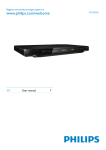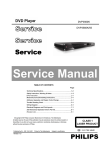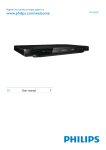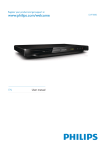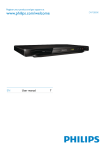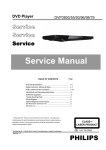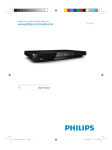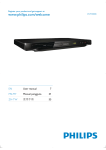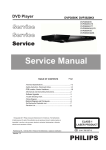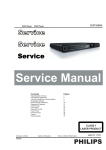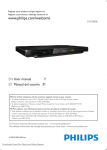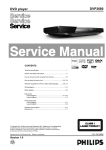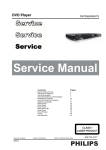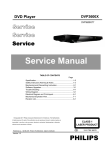Download Service Manual - Manuales de Service
Transcript
DVD Player
DVP3880K(X)
DVP3880K/55
DVP3880K/79/98
DVP3880K/93
DVP3880KX/77
First Generation
Service
Service Manual
TABLE OF CONTENTS
Page
Specification............................................................................1-2
Safety Instruction,Warning & Notes........................................1-3
Mechanical and Dismantling Instruction..................................2-1
Software Upgrades..................................................................3-1
Trouble Shooting ....................................................................4-1
Wiring Diagram........................................................................5-1
Electrical Diagram and Print-layout.........................................6-1
Mechanical Exploded View.....................................................7-1
Revision List............................................................................8-1
This service manual is for DVP3880K
first generation model, which is different from the
second generation DVP3880K model.
For first generation model, the serial number begins
with KX 1Axxxxxxxxxx
© Copyright 2011 Philips Consumer Electronics B.V. Eindhoven, The Netherlands
All rights reserved. No part of this publication may be reproduced, stored in aretrieval system or
transmitted, in any form or by any means, electronic, mechanical, photocopying, or otherwise
without the prior permission of Philips.
Published by LLL - 1203 BU AVM Printed in The Netherlands Subject to modification
CLASS 1
LASER PRODUCT
GB
3141 785 35753
Version 1.3
PHILIPS
1-2
Specifications For DVP3880K/55
Note
• 6SHFLÀFDWLRQVDUHVXEMHFWWRFKDQJHZLWKRXWQRWLFH
DVD region code
Countries
Latin America
Playable media
• Disc
• '9''9'9LGHR9&'69&'$XGLR&'
• '9'55:'9'55:'9'55'/'XDO
/D\HU&'55:0D[LPXPQXPEHURIÀOHV
• File
• Video: .avi, .divx, .mp4, .xvid
• Audio: .mp3, .wma
• Picture: .jpg, .jpeg
• USB storage device
• &RPSDWLELOLW\+L6SHHG86%
• Class support: MSC (Mass Storage Class)
• File system: FAT16, FAT32
• Maximum number of albums/folders: 300
• Maximum number of tracks/titles: 648
Video
• Signal system: PAL, NTSC
• &RPSRVLWHYLGHRRXWSXW9SS2KP
• &RPSRQHQWYLGHRRXWSXW9SS2KP
• +'0,RXWSXWLSLSSLS
1-3
Audio
• FKDQQHODQDORJRXWSXW
• $8',2287/59UPVN2KP
• 'LJLWDORXWSXW9SS2KP
• Coaxial
• +'0,RXWSXW
• Sampling frequency:
• 03N+]N+]N+]N+]N+]N+]
N+]N+]N+]
• :0$N+]N+]
• Constant bit rate:
• 03NESVNESV
• :0$NESVNESV
Main unit
• 'LPHQVLRQV:[+['[[PP
• Net Weight: 1.33 kg
Power
• 3RZHUVXSSO\UDWLQJ²9a+]
• Power consumption: < 8 W
• Power consumption in standby mode: < 0.3 W
Accessories supplied
• Remote control and one battery
• Power cord
• Power plug adaptor
• +'0,FDEOH
• Audio/Video cables
• 8VHU0DQXDO
/DVHUVSHFLÀFDWLRQ
• Type: Semiconductor laser InGaAIP (DVD), AIGaAs (CD)
• Wave length: 658 nm (DVD), 790 nm (CD)
• Output Power: 7.0 mW (DVD), 10.0 mW (VCD/CD)
• Beam divergence: 60 degrees
1-4
Specifications For DVP3880K/98/79
Note
SpeciÀcations are subject to change without notice
DVD region code
Countries
Asia Pacific, Taiwan, Korea
Playable media
Disc
DVD, DVD-Video, VCD, SVCD, Audio CD
DVD+R/+RW, DVD-R/-RW, DVD+R/-R DL (Dual
Layer), CD-R/-RW (Maximum number of Àles: 648)
File
Video: .avi, .divx, .mp4, .xvid
Audio: .mp3, .wma
Picture: .jpg, .jpeg
USB storage device
Compatibility: Hi-Speed USB (2.0)
Class support: MSC (Mass Storage Class)
File system: FAT16, FAT32
Maximum number of albums/folders: 300
Maximum number of tracks/titles: 648
Video
Signal system: PAL, NTSC
Composite video output: 1 Vp-p (75 ohm)
Component video output: 0.7 Vp-p (75 ohm)
HDMI output: 480i, 480p, 576i, 576p, 720p, 1080i, 1080p
1-5
Audio
2-channel analog output
AUDIO OUT L&R : 2 Vrms, 22 kohm
Digital output: 0.5 Vp-p (75 ohm)
Coaxial
HDMI output
Sampling frequency:
MP3: 8 kHz, 11 kHz, 12 kHz, 16 kHz, 22 kHz, 24 kHz, 32
kHz, 44.1 kHz, 48 kHz
WMA: 44.1 kHz, 48 kHz
Constant bit rate:
MP3: 8 kbps - 320 kbps
WMA: 64 kbps - 192 kbps
Main unit
Dimensions (W x H x D): 360 x 42 x 209 (mm)
Net Weight: 1.31 kg
Power
Power supply rating: 110V- 240V~; 50- 60Hz
Power consumption: < 10 W
Power consumption in standby mode: < 0.4 W
Accessories supplied
Remote control and one battery
Audio/Video cables
User Manual
/DVHUVSHFLÀFDWLRQ
Type: Semiconductor laser InGaAIP (DVD), AIGaAs (CD)
Wave length: 658 nm (DVD), 790 nm (CD)
Output Power: 7.0 mW (DVD), 10.0 mW (VCD/CD)
Beam divergence: 60 degrees
1-6
Specifications
For DVP3880K/93
Note
SpeciÀcations are subject to change without notice
DVD region code
Countries
China
Playable media
Disc
DVD, DVD-Video, VCD, SVCD, Audio CD
DVD+R/+RW, DVD-R/-RW, DVD+R/-R DL (Dual
Layer), CD-R/-RW (Maximum number of ÀOes: 648)
File
Video: .avi, .divx, .mp4, .xvid
Audio: .mp3, .wma
Picture: .jpg, .jpeg
USB storage device
Compatibility: Hi-Speed USB (2.0)
Class support: MSC (Mass Storage Class)
File system: FAT16, FAT32
Maximum number of albums/folders: 300
Maximum number of tracks/titles: 648
Video
Signal system: PAL, NTSC
Composite video output: 1 Vp-p (75 ohm)
Component video output: 0.7 Vp-p (75 ohm)
HDMI output: 480i, 480p, 576i, 576p, 720p, 1080i, 1080p
1-7
Audio
2-channel analog output
AUDIO OUT L&R : 2 Vrms, 22 kohm
Digital output: 0.5 Vp-p (75 ohm)
Coaxial
HDMI output
Sampling frequency:
MP3: 8 kHz, 11 kHz, 12 kHz, 16 kHz, 22 kHz, 24 kHz, 32
kHz, 44.1 kHz, 48 kHz
WMA: 44.1 kHz, 48 kHz
Constant bit rate:
MP3: 8 kbps - 320 kbps
WMA: 64 kbps - 192 kbps
Main unit
Dimensions (W x H x D): 360 x 42 x 209 (mm)
Net Weight: 1.31 kg
Power
Power supply rating: 110V- 240V~; 50- 60Hz
Power consumption: < 10 W
Power consumption in standby mode: < 0.4 W
Accessories supplied
Remote control and one battery
Audio/Video cables
User Manual
/DVHUVSHFLÀFDWLRQ
Type: Semiconductor laser InGaAIP (DVD), AIGaAs (CD)
Wave length: 658 nm (DVD), 790 nm (CD)
Output Power: 7.0 mW (DVD), 10.0 mW (VCD/CD)
Beam divergence: 60 degrees
1-8
Safety instruction, Warning & Notes
Safety instruction
1. General safety
2.Laser safety
Safety regulations require that during a repair:
. Connect the unit to the mains via an isolation transformer.
. Replace safety components indicated by the symbol
,
only by components identical to the original ones. Any
other component substitution (other than original type)
may increase risk of fire or electrical shock hazard.
Safety regulations require that after a repair, you must
return the unit in its original condition. Pay, in particular,
attention to the following points:
. Route the wires/cables correctly, and fix them with the
mounted cable clamps.
. Check the insulation of the mains lead for external
damage.
. Check the electrical DC resistance between the mains
plug and the secondary side:
1) Unplug the mains cord, and connect a wire between
the two pins of the mains plug.
2) Set the mains switch the “on” position (keep the
mains cord unplug).
3)
Measure the resistance value between the mains
plug and the front panel, controls, and chassis
bottom.
4)
Repair
or
correct
unit
when
¡
measurement is less than 1M
the
resistance
.
5) Verify this, before you return the unit to the
customer/user (ref. UL-standard no. 1492).
6) Switch the unit “off”, and remove the wire between
the two pins of the mains plug.
This unit employs a laser. Only qualified service personnel
may remove the cover, or attempt to service this device
(due to possible eye injury).
Laser device unit
Type
: Semiconductor laser GaAlAs
Wavelength
: 650nm (DVD)
: 780nm (VCD/CD)
Output power
: 7mW (DVD)
: 10mW (DVD /CD)
Beam divergence: 60 degree
Note: Use of controls or adjustments or performance of
procedure other than those specified herein, may result in
hazardous radiation exposure. Avoid direct exposure to
beam.
1-9
Warning
1.General
2. Laser
. All ICs and many other semiconductors are susceptible to
. The use of optical instruments with this product, will
electrostatic discharges (ESD). Careless handing during
increase eye hazard.
repair can reduce life drastically. Make sure that, during
. Only qualified service personnel may remove the cover
repair, you are at the same potential as the mass of the
or attempt to service this device, due to possible eye
set by a wristband with resistance. Keep components and
injury.
tools at this same potential. Available ESD protection
with a disc loaded inside the player.
equipment:
1)
. Repair handing should take place as much as possible
Complete kit ESD3 (small tablemat, wristband,
connection box, extension cable and earth cable)
. Text below is placed inside the unit, on the laser cover
shield:
4822 310 10671.
2)
Wristband tester 4822 344 13999.
. Be careful during measurements in the live voltage
section. The primary side of the power supply , including
the heat sink, carries live mains voltage when you
CAUTION: VISIBLE AND INVISIBLE LASER
RADIATION WHEN OPEN, AVOID EXPOSURE
TO BEAM.
connect the player to the mains (even when the player is
“off”!). It is possible to touch copper tracks and/or
components in this unshielded primary area, when you
Notes:
service
Laboratories. The double-D symbol is trademarks of Dolby
the
player.
Service
personnel
must
take
precautions to prevent touching this area or components
in this area. A “lighting stroke” and a stripe-marked
printing on the printed wiring board, indicate the primary
side of the power supply.
. Never replace modules, or components, while the unit is
“on”.
Manufactured
under
licence
Laboratories, Inc. All rights reserved.
from
Dolby
1-10
6HUYLFH+LQWV
&$87,21
&+$5*('&$3$&,7256217+(6(592%2$5'0$<'$0$*(7+('5,9(
(/(&7521,&6:+(1&211(&7,1*$1(:'5,9(7+$7¶6:+<%(6,'(67+(6$)(7<
0($685(6/,.(
6:,7&+2))32:(56833/<
(6'3527(&7,21
$'',7,21$/$&7,2160867%(7$.(1%<7+(5(3$,57(&+1,&,$1
7KHIROORZLQJVWHSVKDYHWREHGRQHZKHQUHSODFLQJWKHGHIHFWLYHORDGHU
'LVPDQWOLQJRIWKHORDGHUWRDFFHVVWKH(6'SURWHFWLRQSRLQWLIQHFHVVDU\
6ROGHUWKH(6'SURWHFWLRQSRLQW 'LVFRQQHFWÀH[IRLOFDEOHIURPWKHGHIHFWLYHORDGHU
3XWDSDSHUFOLSRQWKHÀH[IRLOWRVKRUWFLUFXLWWKHFRQWDFWV¿J
5HSODFHWKHGHIHFWLYHORDGHUZLWKDQHZORDGHU
5HPRYHSDSHUFOLSIURPWKHÀH[IRLODQGFRQQHFWLWWRWKHQHZORDGHU
5HPRYHVROGHUMRLQWRQWKH(6'SURWHFWLRQSRLQW
$77(17,217KHODVHUGLRGHRIWKLVORDGHULVSURWHFWHGDJDLQVW(6'E\DVROGHUMRLQWZKLFKVKRUWFLUFXLWVWKHODVHUGLRGHWRJURXQG
)RUSURSHUIXQFWLRQDOLW\RIWKHORDGHUWKLVVROGHUMRLQWPXVWEHUHPRYHDIWHUFRQQHFWLRQORDGHUWRWKHVHW
Solder Joint
(6'SURWHFWLRQSRLQWLVDFFHVVLEOHIURPWRSRIORDGHU
2QO\DSSOLFDEOHIRUGHIHFWLYHORDGHUQHHGHGWREHVHQWEDFNWRVXSSOLHUIRUIDLOXUHDQDO\VLVDQGWRVXSSRUWEDFNFKDUJLQJ
HYLGHQFH
7KLVLVDOVRDSSOLFDEOHIRUDOOSDUWQHUVKLSZRUNVKRSV
1-11
Notes
Lead-Free requirement for service
INDENTIFICATION:
x
Regardless of special logo (not always indicated)
Use only original spare-parts listed in the
Service-Manuals. Not listed standard-material
(commodities) has to be purchased at external
One must treat all sets from 1.1.2005 onwards, according
next rules.
companies.
x
Important note: In fact also products a little older can also
be treated in this way as long as you avoid mixing
solder-alloys (leaded/ lead-free). So best to always use
SAC305 and the higher temperatures belong to this.
Special information for BGA-ICs:
- always use the 12nc-recognizable soldering
temperature profile of the specific BGA (for
de-soldering
always
use
highest
lead-free
temperature profile, in case of doubt)
Due to lead-free technology some rules have to be
respected by the workshop during a repair:
- lead free BGA-ICs will be delivered in so-called
‘dry-packaging’ (sealed pack including a silica gel
x Use only lead-free solder alloy Philips SAC305 with
order code 0622 149 00106. If lead-free solder-paste is
pack) to protect the IC against moisture. After
required, please contact the manufacturer of your
opening, dependent of MSL-level seen on
solder-equipment. In general use of solder-paste within
indicator-label in the bag, the BGA-IC possibly
workshops should be avoided because paste is not easy
still
to store and to handle.
communicated via AYS-website.
to
be
baked
dry.
This
will
be
Do not re-use BGAs at all.
x Use only adequate solder tools applicable for lead-free
solder alloy. The solder tool must be able
has
x
For sets produced before 1.1.2005, containing
o To reach at least a solder-temperature of 400°C,
leaded soldering-tin and components, all needed
o To stabilize the adjusted temperature at the
spare-parts will be available till the end of the
solder-tip
o To exchange solder-tips for different applications.
x Adjust your solder tool so that a temperature around
360°C – 380°C is reached and stabilized at the solder
joint. Heating-time of the solder-joint should not exceed
service-period. For repair of such sets nothing
changes.
x On our website:
www.atyourservice.ce.Philips.com
You find more information to:
~ 4 sec. Avoid temperatures above 400°C otherwise
BGA-de-/soldering (+ baking instructions)
wear-out of tips will rise drastically and flux-fluid will be
Heating-profiles of BGAs and other ICs used in
destroyed. To avoid wear-out of tips switch off un-used
Philips-sets
equipment, or reduce heat.
x Mix of lead-free solder alloy / parts with leaded solder
alloy / parts is possible but PHILIPS recommends
You will find this and more technical information
within the “magazine”, chapter “workshop news”.
strongly to avoid mixed
For additional questions please contact your local
solder alloy types (leaded and lead-free). If one cannot
repair-helpdesk.
avoid, clean carefully the
solder-joint from old solder alloy and re-solder with new
solder alloy (SAC305).
1-12
PCB LOCATION
MAIN BOARD
LOADER
POWER BOARD
USB+OK BOARD
FRONT BOARD
VERSION VARIATIONS
DVP3880
Type/Versions
K/93
K/55
KX/77
KX/78
Main Board
C/M
C/M
C/M
C/M
C/M
Front Control Board
C/M
C/M
C/M
C/M
C/M
Power Board
C/M
C/M
C/M
C/M
C/M
M
M
M
M
M
Board in used
Karaoke+USB Board
*C:Component Level Repair
*M:Module Level Repair
*X:Used
K/98
2-1
Mechanical and Dismantling Instructions
Dismantling Instruction
Detailed information please refer to the model set.
The following guidelines show how to dismantle the player.
Step1: Remove 5 screws around the Top Cover, and then remove the Top Cover (Figure 1).
The sample is DVP3880K/98.
Figure 1
Step2: If it is necessary to dismantle Loader or Front Panel, the Front door should be removed first. (Figure 2)
Note: Make sure to operate gently otherwise the guider would be damaged.
Please kindly note that dismantle
the front door
assembly carefully to avoid damage tray and the front door.
Figure 2
2-2
Mechanical and Dismantling Instructions
Detailed information please refer to the model set.
Dismantling Instruction
Step3: If the tray can’t open in normal way, you can make it through the instruction as below (Figure 3).
Note: Make sure to operate gently otherwise the guider would be damaged.
Figure 3
Step4: Dismantling Front Panel, disconnect the connectors (XP5, XP6,XP7), need release 4 snaps of Front Panel & 2 snaps
of bottom cabinet , then gently pull the Panel out from the set. (Figure 4 - Figure 6)
XP2
XP1
XP4
XP3
Figure 4
XP6
XP5
XP7
2-3
Mechanical and Dismantling Instructions
Dismantling Instruction
Detailed information please refer to the model set.
Step5: Dismantling Loader, disconnect the 3 connectors (XP2, XP3, XP4) aiming in the below figure, and remove 1 screw that
connects the loader and the bottom cabinet. (Figure 5)
Figure 5
Step6: Dismantling Main Board, first disconnect the connector (XP1), and then remove 5 screws. (Figure 6)
Step7: Remove the 4 screws on Power Board to dismantle the Power Board. (Figure 6)
Figure 6
3-1
Software upgrade
Preparation to upgrade software
1) Start the CD Burning software and create a new CD
project (Data Disc) with the following setting:
B. Read out the software versions to confirm upgrading
Label: DVP3XXX (No need the label name)
File Name: DVPXXXX_XX.BIN
Power on the set and open the tray, then press <option>
to check the File Name.
1) Power on the set and press <Setup> button on the
remote control.
2) Press <Next><Next><Prev><Prev> button.
The software version and other information are display
Note: It is required capital letter for the File System
on the TV screen as follows:
name.
Version
2) Burn the data onto a blank CDR
SUB-VER XX.XX.XX.XX (software version of
XX.XX.XX.XX (Main version)
application software)
A. Procedure for software upgrade:
8032 XX.XX.XX.XX
1) Power on the set and insert the prepared Upgrade
Servo XX.XX.XX.XX (software version of servo)
CDR.
RIS XX.XX.XX.XX
2) The set will starts reading disc & response with the
DSP XX.XX.XX.XX
following display TV screen:
Region Code X
Upgrade File DETECTED
Upgrade?
Press Play TO START.
3) Press <OK> button to confirm, then screen will display :
Files coping…
UPGRADING…
4) The upgraded tray will automatically open when files
coping complete, then take out the disc.
5) About 1 minute later, the trace will automatically close
when upgrading complete.
Caution: The set must not be power off during
upgrading, Otherwise the Main board will be
damaged entirely.
Trouble shooting chart
4-1
Spindle motor does not move
Motor no move
Go
Check the FFC connection
No
Correct connection
between 24P and the loader.
Yes
Check whether “MO_VCC”
(+5V) voltage
No
Check the MO_VCC power
is normal.
supply
Yes
Check whether laser voltage
No
(1.9V for CD & 2.4V for DVD)
Check/Replace Q5,Q6,Q7,Q8.
on L9 and L10
Yes
1.Whether voltage on pin 15of U20
No
varies between 0 and 3.3V (3.3V for
CD and 0V for DVD),
Check/ Replace U20.
2.Whether peripheral components
are eroded or badly soldered.
Yes
1.
Check opu focus
No
Check
U20
pin17
FOCUS_PWM
signals
2.If there are F+, F-, T+ and T- signals
output from U2.
Yes
Check/Replace the loader
FOCUS_PWN waveform
Trouble shooting chart
4-2
The power can not be on or off
The power can’t be
on or off
Go
Check the power supply
No
on the power board is
Repair the power board
normal.
Yes
Check if the XS301 on the
front board to XP5 on the
Yes
No
Check/Correct
connection
decoder board is in good
contact.
Yes
Whether the connection
No
to K303 is broken.
Correct the connection
Yes
Whether there is 0V and
3.3V voltage difference on
Pin 39 PCON of U20.
Yes
No
Replace U20.
4-3
All output voltages on the power board is 0V or deviated.
Trouble shooting chart
All output voltages on
the power board is 0V or
deviated
Yes
Check whether
Yes
Replace F1
F1 is blown
No
Check whether there is
Replace C1&C2 if D1, D2, D3, D4 are
No
normal.
300V on C1 or C2.
Yes
Check whether 100KHz
oscillating signal on
Pin6 of U20
No
Check/ replace U20.
U1(PIN 3 - RC waveform)
U1(PIN 8 - Drain waveform)
Yes
Check if +5V and +12V are
short.
Yes
Check whether the components in the
short-circuit voltage are defected or eroded.
No
Check whether U20 are eroded.
Trouble shooting chart
4-4
Disc cannot be read.
Disc cannot be read.
Yes
Check the FFC connection
No
Check the loaded circuit
between 24P and the loader.
Yes
1.Check voltage on pin 15 of U20 varies
Check whether there is laser
voltage (1.9V for CD and 2.4V for
No
between 0 and 3.3V:
Æ3.3V for CD
Æ0V for DVD
DVD) on L9 and L10.
2.Check whether peripheral components
are eroded or defect
Yes
Check
U20,
U2,
and
No
peripheral components are
Re-solder or replace the defective parts
eroded or badly soldered.
Yes
Check if there is RFO signal on
pin17 of XP2. (The normal RFO
No
Check U20 and peripheral components
signal is a clear reticulated wave)
Yes
Check the connection
between U20
Yes
Replace U20 or loader.
No
Correct connection
Trouble shooting chart
4-5
Only DVD disc or only disc except DVD can be played
Only DVD disc, or only disc
except DVD can be Played.
Go
Check
the
FFC
connection between
24pin and the loader.
No
Check the loaded circuit
Yes
Check laser voltage (2.4V) output
Check the solder status on U20 and
No
on L10, if pin10 of U20 is at low
peripheral components
level.
Yes
No
Check whether there
is voltage variance on
pin 17 of U20.
check if bad solder exist on U20 and
peripheral components
Yes
Check whether pins of U20
and
peripheral
No
components
are badly soldered, defected
Replace the bad spare parts
Yes
Check Q5, Q7
whether in good
condition
Yes
Change U20 or the loader.
No
Correct connection
Trouble shooting chart
4-6
No display on LED, and buttons do not work
No display on LED, and
buttons do not work
Yes
Check whether there is
correct
contact
between
No
Correct connection
XS301 and XP5
Yes
Check VCC(+5v) voltage
on the power and front
Fix power supply board top
a power supply for should
electric circuit
No
board
Yes
Check there are STB, SDA
and SCK signals on XS301
on the front board.
No
Check the U20’s pin 36,37,38
arrive the XP5 connect condition
XP5 (PIN 1 CLK)
XP5 (PIN3 DOUT)
Yes
1.Check whether bad solder exists on
U301 and pins of LED,
2.Check whether the circuit connected to
K302, K303 and K301 is broken,
3.Check whether R300, R301 and R302
are open-circuit.
Yes
Replace U301 or LED
No
Correct connection
Trouble shooting chart
4-7
Distorted audio and loud noise
Distorted audio and
loud noise
Yes
Check the power supply voltages
+12V to the operation amplifying
No
Check Q3
Q3 is normal.
Yes
No
Check whether the muting transistor
R167,R152 are normal
Replace R167,R152
Yes
Check
whether
the
No
muting
Replace Q48,Q50,
transistor Q48,Q50, are normal
Yes
Checking the U12 leads
No
Correct connection
the feet has no to break to
open
Yes
No
Check the voltage on
Replace R76,CE38,C152
pin3 or pin5 of U12 is
OK.
(Should be 2.5~3.1V)
Yes
Check whether the U1 or
U12 powersupply normal
Yes
Replace U20
No
Check U12
Trouble shooting chart
4-8
Abnormal color of video picture
Abnormal color of
video picture
Yes
Check
whether
the
No
Check Y2, R20,R27,C22 and C23
27MHz output signal
Yes
Check whether the 3.3V
and 1.8V power supply
voltages on the decoder
board are normal.
No
Check other of power supply electric
circuit
Yes
Check whether the
video filter network
circuit is normal.
No
Correct the connection
Yes
Check if the video signals on Pin
98,100,101,102, of U1 are normal
No
change U20
Trouble shooting chart
4-9
Remote reception is insensitive or fails.
Remote reception is
insensitive or fails.
Go
Check if the remote
control works properly.
No
Check battery
Yes
Check if the power supply
voltage to the remote censor
No
Check
R315、C315
is normal
Yes
Use an oscilloscope to check if there is
No
output waveform from the first pin IR of the
REM301(PIN1 - RC waveform)
remote censor after pressing button on the
remote control.
Yes
Check if there is IR
signal on pin 33 of U20
Yes
Change U20
IR waveform
No
Correct connection
Trouble shooting chart
4-10
No video picture, no sound.
No video picture,
no sound.
Check whether all the voltages
No
Check the loaded circuit
from the power board to the
CVBS(R21 point) waveform
decoder board are normal.
Yes
Check if the reset circuit consisting
ofCE7, D2 is normal (at a low level
for
tens
of
milliseconds,
No
Change CE7, D2.
then
constantly at 3.3V).
27Mhz waveform
Yes
Check whether there is
Crystal oscillator Y2 and
No
peripheral components
27MHz signal output.
are defected or eroded.
Yes
Check if there is 128MHz
No
Check whether
short-circuit or bad
solder on U4,U5,U8,
U7
signal output on R67.
SDRAM(R67 DCLK) waveform
No
Yes
Check if short-circuit and
bad solder exist on Pin
98
Check U20.
No
Yes
Yes
Reconnect the component in
5-1
5-1
DVP3880K
BLOCK & WIRING DIAGRAM
COAX
Pr
Y
Pb
CVBS
R
HDMI
P5
P1
P2
AUDIO
AMP&LPF
24
DVD LOADER
L
VIDEO LPF&DRIVE
XP2
24PIN*0.5
1
XP3
5PIN*2.0
5
+5V
+5V
GND
+12V
GND
16M
FLASH
U176
XP7
4PIN*2.0
XP5
10PIN*2.0
8
1
1
XP6
3PIN*2.0
4
1
3
MAIN BOARD
MP-1
8
XS301
10PIN*2.0
+12VA
GND
MIC
USB_DM
USB_DP
GND
VCC_USB
1
LED/KEY&LEDˇET6202
XS601
1
XS201
5PIN*2.5
5
5
AM5888S
U10
MOTER
DRIVER
6
1
POWER_K
VSCK
VSTB
VSDA
GND
5V
IR
DV33
LOAD+
LOADTROUT
GND
TRIN
40-D89G2U-MA*2G
6PIN*2.0
XP4
SPS+
LIMIT
GND
SLSL+
1
1
64M U186
SDRAM
MT1389G
XP1 5PIN*2.5
U20
7PIN*2.0
1
7
40-P3380K-KUD2G
USB+OK BOARD
POWER
SUPPLY
6-1
6-1
5
4
3
2
1
Front Control Board Circuit Diagram:
5V
D
D
R316
)5200$,1%2$5'
XS301
8PIN/2.0mm/140mm
DV33
1 1
IR
IR
2 2
5V
VCC
3 3
4
GND
4
DATA
5
DATA
5
CS
6
CS
6
CLK
CLK
7 7
POWER_K
8
8
R306
51K
R303 R304 R305
4.7K 4.7K 4.7K
U301
DRIVER_LED_ET6202
0R
0R
R307
R308
R309
R310
10K
10K
C301 C302
C303
0.1uF/50V/Y5V
1K
SEG1
1K
SEG2
SEG3
SEG4
SEG5
SEG6
SEG7
CE300
+
47uF/16V
1
2
3
4
5
6
7
8
9
10
11
12
13
14
KEY1
KEY2
100pF/50V/NP0
C300
100pF/50V/NP0
R3
R1
100pF/50V/NP0
DATA
CLK
CS
NC/33 LED-
OSC
DI/O
CLK
STB
KEY1
KEY2
VDD
SEG1/KS1
SEG2/KS2
SEG3/KS3
SEG4/KS4
SEG5/KS5
SEG6/KS6
SEG7/KS7
GND
GRID1
GRID2
GND
GRID3
GRID4
GND
VDD
SEG14/GRID5
SEG13/GRID6
SEG12/GRID7
SEG10/KS10
SEG9/KS9
SEG8/KS8
LED1
GRID[1:5]
28
27
26
25
24
23
22
21
20
19
18
17
16
15
GRID5
GRID4
GRID3
GRID2
GRID1
SEG8
SEG7
SEG6
SEG5
SEG4
SEG3
SEG2
SEG1
GRID1
GRID2
GRID3
GRID4
5V
GRID5
NC/33 LED+
R323
SEG8
13
12
11
10
9
8
7
6
5
4
3
2
1
GRID5
GRID4
GRID3
GRID2
GRID1
SEG8
SEG7
SEG6
SEG5
SEG4
SEG3
SEG2
SEG1
LED_2501AHG1
SEG[1:8]
K301
K302
R312
D301
open/close
1N4148
play/pause
1K
K303
R311
D302
POWER_K
C
power
POWER_K1
C
NC/1K
NC/1N4148
R313 NC/0
DV33
REM301
GND
GND
VCC
GND
IR
IRM_12mm
5V
R315 100
5
4
3
2
1
R318
NC/100
R314
0
IR
+ CE301
NC/47uF
C306
C315
47pF/50V/NP0
1uF/50V/Y5V
output
DV33
0.3W
R317
1K
1W
R317
R319
R321
R322
R323
R316
R313
Y
Y
Y
Y
Y
N
N
N
N
N
N
N
N
Y
Y
Y
LED+
5V
Q1
R319
Q1
4.7K
+
LED2
NPN_3DG3904M
CE302
10uF/16V
LED_RED
R321
1K
B
LED-
B
R322
0
A
A
5
4
3
2
1
6-2
6-2
1
2
3
4
5
Karaoke and USB board Circuit Diagram:
R210
R202
12V
12VA
12VA
REF
CE200
150
C201
A
22K
CE201
A
R211
R203
0.1u
22uF
C205
47p
R205
180K
22uF
22K
2
5.6K
2.2uF
3
C203
8
R200
10K
8
U200A
C211
1
C208
100p
2.2uF
NJM4558
5
+
6
-
C204
100p
1000p
REF
NJM4558
MIC_OUT
7
4
C210
+
R201
1
2
3
-
KARAOKE
B
47-EAR024-XX0
P601
KARAOKE INPUT
4
100K
B
U200B
12VA
R207
100K
C206
47p
R206
20K
C209
2.2uF
P600
USB
C
C
R208
47-USB003-XX2
USB
1
2
3
4
5
6
VCC
USB_DN
USB_DP
SGND
MGND
MGND
MIC_OUT
MIC
12V
1K
R209
680
VCC
SGND
USB_DN
USB_DP
8PIN/2.0mm
XP601
L200
MGND
1
2
3
4
5
6
7
AGND
500Z
D
D
L201
MGND
AGND
500Z
L202
MGND
SGND
500Z
E
E
1
2
3
4
5
6-3
6-3
A
B
C
D
E
Power Supply Board Circuit Diagram:
1
1
* CAUTION :
THE PARTS MARKED WITH
ARE IMPORTANT PARTS ON THE SAFETY.
PLEASE USE THE PARTS HAVING THE DESIGNATED PARTS NUMBER WITHOUT FAIL.
F501
FUSE_2A250V/2W 10 Ohm
TR501
NTC 10
2
CX501
+
CON502
RV501
VTC 470
OHM
0.1uF/275Vac
+
1
AC INPUT
1
2
+
CN501
+
AC INPUT
D501
D502
1N4007
1N4007
D503
D504
L503
20mH
2
+
AC INPUT
1N4007
1
L501
680UH
C501
10uF/400V
+
1N4007
C502
15uF/400V
FB501
FB
T501
6
2
2
C504
103/400V
R502
300K
5
R503
300K
CON503
D506
5
4
3
2
1
4
D507
FR107
FR102
8
+
C505
47uF/25V
GND
D509
BR
Drain
Drain
2
11
1
2
1
FB
U501
VIP17/VIP27
L502
6.8uH
9
+
4
CONT
3
2
Vdd
SB360
GND
6X2.5 HEADER
5
7
8
10
1
GND
+12V
GND
+5V
+5V
+
C507
1000uF/16V
C508
470uF/16V
R505
12k 1%
R506
22 1/6w
R507
11.3k 1%
1
4
D508
FR102
3
D510
18HSC
U502
PC123X92
R508
1k 1/6w
2
C510
0.1uF/63V
3
R516
22
+
C509
47uF/50V
3
R510
10k 1/6w
U503
TL431
3
R509
220 1/6w
C511
0.1uF/63V
2
1
CY501
1000PF/250VAC
4
4
A
B
C
D
E
6-4
6-4
A
B
C
D
E
Main Board Circuit Diagram: Power Supply
XP1
5pin/2.5mm
MO_VCC
960mA
+5VD
+5VP
GND
+P12V
1
2
3
4
5
R10
NC/0
89G_3V3
VCC
Q10
SS8550
C1
0.1uF
DV33
+12V: +12V(+-10%)
1
VCC
DV33
C77
1uF
+5V: +5V(+-2.5%)
R22
C109
0.1uF
C111
0.1uF
R120
10K
R115
4.7K
1
XP5
NC/0
Q3
SS8550
R58
2.2K
+12V
IR
R50
8
7
6
5
4
3
2
1
100
+12V
VSDA
VSTB
VSCK
POWER_K
100mA
C12
0.1uF
R12
4.7K
R13
10K
R51
R52
R53
R326
220
220
220
1K
R14
1.3K
8
7
6
5
4
3
2
1
OFF-PAGE CONNECTION
URST#
MO_VCC
C81
C46
C45
C44
C42
C43
100pF/NC
100pF/NC
0.1uF
100pF
100pF/NC
DV33
USBPC
C82
0.1uF/NC
8PIN/2.0mm
SD33
URST#
(3,4)
MO_VCC
(2,3,6)
SD33
4
DV33
(2,3,4,7)
0.1uF/NC
DV33
R54
NC/10K
R29
Q2
PCON
R33
10K
RFV33
BT3904
1K
89G_3V3
V12
TO FRONT PANEL
RFV33
VSDA
R8
RFV33
0/FB500
2
VSTB
+
CE23
47uF/6.3V
IR
3
3
AADVDD
2
3
3
3
MO_VCC
89G_3V3
POWER_K
810mA
C75
0.1uF
370mA
D30
440mA
POWER_K
3
R40
USBPC
RL207
FB6
500
3
VSDA
PCON
AADVDD
CE24
47uF/6.3V
(3)
VSCK
IR
PCON
+
3
VSTB
C73
0.1uF
FB1
500
3
89G_3V3
V12
VSCK
DV33
RFV33
USBPC
3
4.3R/2W
R48
1R/1W
SD33
3
Q17
SS8550
TR_B2
+ CE6
C76
0.1uF
V12
100uF/16V/NC
3
TR_B1
Q16
SS8550
+
AADVDD
DV33
CE4
220uF/16V
C108
0.1uF
R6
AUDIO ADC
AADVDD
4.7/0603
REGO2
R95
20K 1%
+ CE5
C4
0.1uF
+
47uF/16V/NC
3
3
REGO1
3
CE3
220uF/16V
3
C107
0.1uF
R96
12K 1%
RESET Circuit
URST#
DV33
R34
RESET_A
R15
15K/NC
R19
27K
R18
3.3K/NC
RESET_A
0
R26
URST#
R17
Q21
Q22
1K
+
3.3K/NC 2N3904/NC
R16
4.7K/NC
2N3904/NC
CE7
10uF/16V
CEL5-5
C21
0.1uF
C21 must closer to PIN43 of 1389L/K.
4
4
A
B
C
D
E
6-5
6-5
A
B
C
D
Main Board Circuit Diagram: MT1389G
DV33
D3
BAT54C
E
0.1uF
C27
DQ[0..15]
RFV12-1
C
OPO
C83
SOT-23
0.1uF
RFV33
SERVO RF DeCAP.
RFVDD3
C35
RFV33
C36
0.01uF
XP4
6PIN/2.0mm
+
C34
0.1uF
C48
DCLK
RAS#
CAS#
WE#
100K
Y2
R27 51
XI
XO
M_BIAS
0.1uF
+
C72
CE8
47uF/6.3V
4.7uF
+
C71
CE9
47uF/6.3V
0.1uF
C20
10uF/10V
RFO
CE2
RF Reference
0.1uF
0R/FB500R
VR_CD
Put these circuits as
closer as possible to
MT1389
SF_CK
SF_CS
SF_DI
SF_DO
CVBS_OUT
V_R
V_B
V_G
TROPEN
STBY
1S
RFV12-2
RFVDD3
2SK3018
SC-70
R1
SONY 313
VR_CD
VR_DVD
L6
FB/2.2
R38
15K/NC
C32
0.1uF
C5
4.7uF
+ CE10
C6
0.1uF
100uF/16V
100
R60
NC/0R
25
26
100
VCC
R39
XP2
SMD0.5 TOP
89G_3V3
C3
FB3 0R 0.1uF
Very Important to
reduce Noise
LD-DVD
C7
10uF/10V
R3
V12
FB4
5.1K 1%
USB_V12
SF_CS
SF_DO
SF_DI
SF_CK
UP1_6
UP1_7
GPIO11
GPIO6
URST#
0R
MDI1
LD-CD
C9
10uF/10V
C8
0.1uF
C78
E
AVCC1
V20
C94
NC/0.1uF
0.1uF
F
B
A
RFO
IOA
D
C
TT+
F+
F-
R97
NC/0
L10
10uH/NC
LDO2
129
AR
AL
128
127
126
125
124
123
122
121
120
119
118
117
116
115
114
113
112
111
110
109
108
107
106
105
104
103
102
101
100
99
98
97
MT1389G
LQFP 128
V1.0
L9
10uH/NC
ASPDIF
AKIN1
96
95
94
93
92
91
90
89
88
87
86
85
84
83
82
81
80
79
78
77
76
75
74
73
72
71
70
69
68
67
66
65
GPO14
DACVDD3
TX2+
TX2-
C14
9012
R98
NC/0
CE11
Q23
47uF/6.3V
27
28
R45
4.7
9012
R49
R46
4.7
10K
D4
1N4148
A
K
FB2
TX1+
TX1-
0R
TX0+
TX0-
R32
R5 2.2R
R4
HPLG
ASPDIF
RAS#
CAS#
WE#
MA4
MA5
MA6
89G_3V3
C11
0.1uF
C80
4.7uF
SOT-23-AO3401
R114
1K
V12
C133
10uF/10V/NC
TX2+
TX2HPLG
DV33
AADVDD
V12
RFV33
RESET_A
DV33
MO_VCC
RXD
TxD
GND
C10
NC(100pF)
1
2
3
4
4pin/2.0mm
V12
FOSO
TRSO
FMSO
DMSO
R41
R42
R43
R44
C38
C39
C40
27k
27k
15k
10k
FOO
TRO
FMO
DMO
Default
4
FMSO
RESET_A
C128
TR_B2
+
0.1uF/25V
TRSO
CE105
M_BIAS
100uF/16V
STBY
30
G2
22
23
24
25
26
27
28
GND
VINLD
RESET
TRB2
VINTK
BIAS
MUTE
C127
R124 0.1uF/25V
10K
AM5890
G1
29
7
6
5
4
3
2
1
MO_VCC
0.015uF
TP10
TP11
TP12
TP13
MO_VCC
Front
AADVDD
2
89G_3V3
1
V12
RFV33
RESET_A
(2)
1
2
2
TR_B1
TR_B2
GPIO11
RXD
GPIO6
TXD
2
REGO1
PCON
VSDA
F1
VSTB
C85
C87
0.1uF
0.1uF
C90
2
TR_B2
2
REGO2
2
PCON
2
VSCK
2
VSDA
2
VSTB
0.1uF
R31
180
R59
180
USBPC
2
C91
USBPC
0.1uF
Q9
PBSS5320T
Chip Decap.
TP18
TP19
DV33
C49
R62
10K
R63
10K
0.1uF
TROUT
TRIN
R9
R11
LOADLOAD+
1K
1K
1
2
3
4
5
C18
0.1uF
1
2
3
4
USB_DM
USB_DP
0.1uF
D11
0.1uF
ESD0603
ESD0603
MotorDriver
B
C
POWER_K
2
2
4
C74
D10
USBPC
XP7
4PIN/2.0mm
XP3
5PIN/2.0mm
R118
10K
C19
A
(2,3,4,7)
[FUSE(500MA)]
REGO1
DMSO
REGO2
TR_B1
FOSO
(2,4)
DV33
IR
POWER_K
TROPEN
TRCLOSE
URST#
3
IR
V12
REV
FWD
REGO1
VINSL+
REGO2
TRB1
VINFC
7
Power
REGO2
VCC_USB
R136
3K
7
C41
89G_3V3
R125
1K 1%
7
7
HPLG
10K
U13
F+
FSPSP+
LOAD+
LOAD-
7
7
TX2+
TX2-
MO_VCC
VSCK
14
13
12
11
10
9
8
TX1+
TX1-
2
89M_CEC 7
M_BIAS
VOFC+
VOFCVOSLVOSL+
VOTR+
VOTRVCC
7
7
UP1_[6..7]
URST#
MO_VCC
VOTK+
VOTKVOLD+
VOLDVCC2
VCCD
VCTL
TX0+
TX0-
TMDS I/F
NC(100pF)
330pF 330pF 0.1uF
15
16
17
18
19
20
21
7
7
XP8
89G_3V3
LDO1
TT+
SL+
SL-
TXC+
TXC-
89M_CEC
REGO1
TP14
TP15
TP16
TP17
6
6
89G_3V3
C16
+ CE33
100uF/10V
9012
6
ASPDIF
AKIN1
UP1_[6..7]
MO_VCC
RS-232
MT1389G
MT1389M
6
6
AUDIO_MUTE
TX1+
TX1-
Q1
NC/(CES2302)
D
S
2.5K 1%
9012
47uF/6.3V
5
5
5
5
TX0+
TX0-
TR_B1
Q8
CVBS_OUT
V_R
V_B
V_G
TXC+
TXC-
R7 0/NC
TXC+
TXC-
MA3
MA2
MA1
MA0
MA10
BA1
BA0
V12
C13
0.1uF
Q24
+ CE12
4
4
4
4
89G_3V3
RFV33
R57
33K
SOD-323-D
SF_CK
SF_CS
SF_DI
SF_DO
AUDIO I/F
0.1uF/NC
RFV33
NC/0.1uF
1
AR
AL
Q7
NC
C79
AR
AL
AUDIO_MUTE
VREF / GPO14
DACVDDC
TX2P
TX2N
AVDD12_D
TX1P
TX1N
AVSS12
TX0P
TX0N
AVDD12_C
TXCP
TXCN
AVDD33_12
EXT_RES
GPIO10 / HPLG
SPDIF / GPIO12
DVDD12
RA3
RA2
RA1
RA0
RA10
BA1
BA0
DVDD33
RAS#
CAS#
RWE#
RA4
RA5
RA6
33
34
35
36
37
38
39
40
41
42
43
44
45
46
47
48
49
50
51
52
53
54
55
56
57
58
59
60
61
62
63
64
C37
AVDD12_2
AVDD33_1
XTALI
XTALO
V20
V14
REXT / GPO5
MDI1
LDO1
LDO2
AVDD33_2
DMO
FMO
TRAY_OPEN
TRAY_CLOSE
TRO
FOO
FG / GPIO2
USB_DP
USB_DM
VDD33_USB
PAD_VRT / GPIO37
VDD12_USB
SF_CS_
SF_DO
SF_DI
SF_CK
UP1_6 / SCL
UP1_7 / SDA
GPIO11
GPIO6
PRST#
IR
GPIO3
VSCK
VSTB
VSDA
POWER_K
CKE
TOP
3
XO
V20
M_BIAS
GPO5
MDI1
LDO1
LDO2
AVDD33
DMO
FMO
PIN_14
PIN_15
TRO
FOO
TRIN
USB_DP
USB_DM
USB_V33
89G_3V3
1
2
3
4
5
6
7
8
9
10
11
12
13
14
15
16
17
18
19
20
21
22
23
24
1
2
3
4
5
6
7
8
9
10
11
12
13
14
15
16
17
18
19
20
21
22
23
24
25
26
27
28
29
30
31
32
XI
+
2
CKE
AUDIO_MUTE
DQ13
DQ12
DQ11
DQ10
DQ9
DQ8
DQM1
DCLK
MA11
MA9
MA8
MA7
2
IOA
GPIO35
DQ0
DQ1
DQ2
DQ3
DQ4
DQ5
DQ6
DQ7
DQM0
DQ15
DQ14
G
CKE
G
GPIO34
D
4
4
4
4
M_MUTE_R
GPO14
RFF
RFE
RFD
RFC
RFB
RFA
RFH / OPINN
RFG / OPINP
RFIN / OPOUT / GPI36
RFIP
AVDD12
ADACVDD2
ADACVDD1
CENTER / GPIO
ALS / GPIO
AL / GPIO
AVCM
AR / GPIO
ARS / GPIO
LFE / GPIO
PAD_APLLCAP / GPIO35
APLLVDD_GPIO / GPIO34
AADVDD
AKIN1 / GPIO21
ADVCM / GPIO20
AKIN2 / GPIO19
R
B
G
DACVDDB
CVBS
FS
89M_CEC
E-PAD/GND
GPIO3
3
M_MUTE_R
VR_DVD
U20
4
DCLK
RAS#
CAS#
WE#
VIDEO I/F
R108
560
IR
GPIO3 / INT#
GPIO4
GPIO13
GPIO9
GPIO8
GPIO7 / CKE
DVDD33
RD0
RD1
RD2
RD3
RD4
RD5
RD6
RD7
DQM0
RD15
RD14
DVDD12
RD13
RD12
RD11
RD10
RD9
RD8
DQM1
RCLK
RA11
RA9
RA8
RA7
PIN_15
4
BA[0..1]
S-FLASH
M_MUTE_R
GPIO35
GPIO34
AADVDD
AKIN1
ADVCM
PCON
V_R
V_B
V_G
DACVDD3
CVBS_OUT
PIN_14
ADACVDD
TROUT
TRCLOSE
4
DQM[0..1]
C31
NC/15pF
C29
1uF
LIMIT
E
F
D
A
B
C
OPOPO
GPI36 220pF
C30
RFV12-1
GPI36
GPO5
4
MA[0..11]
DRAM I/F
C23
33pF
27MHz
10uF/10V
0.1uF
V20
C22
FB10 33pF
C28
SLSL+
R20
2200pF
1
2
3
4
5
6
1K
BA[0..1]
Crystal
0.1uF
220uF/16V
10K LIMIT
R23
DQM[0..1]
+
1
SP-A
SP+
R128
DQ[0..15]
MA[0..11]
0.1uF
10K
DV33
R21
0
DACVDD3
RFV12-2
C84
SP-A
0
0.1uF
0.1uF
R28
R30
C17
C15
1
ADACVDD
C33
V12
B
CE1
C24
OFF-PAGE CONNECTION
89G_3V3
OP-
10K
10uF/6.3V
R24
R25
C93
SP-
E
D
E
6-6
6-6
A
B
C
D
E
Main Board Circuit Diagram: SDRAM&FLASH
SDR_DRAM (Dual Layout)
R196
4
CKE
CKE
SDCKE
U4
33
1
MA0
MA1
MA2
MA3
MA4
MA5
MA6
MA7
MA8
MA9
MA10
MA11
DBA0
DBA1
SD33
DCLK
R65
10K
SDCKE
R66
10K
DCS#
R67
SDCLK
SDCKE
SDCLK
C51
47
NC/5P
BA0
BA1
DRAS#
CAS#
WE#
DCAS#
DWE#
38
37
A0
A1
A2
A3
A4
A5
A6
A7
A8
A9
A10/AP
A11
BA0/A13
BA1/A12
DQ0
DQ1
DQ2
DQ3
DQ4
DQ5
DQ6
DQ7
DQ8
DQ9
DQ10
DQ11
DQ12
DQ13
DQ14
DQ15
CLK
CKE
DCS#
DRAS#
DCAS#
DWE#
19
18
17
16
CS
RAS
CAS
WE
DQM0
DQM1
15
39
DQML
DQMH
36
40
NC
NC
54
41
28
VSS
VSS
VSS
DBA0
DBA1
RAS#
23
24
25
26
29
30
31
32
33
34
22
35
20
21
DQ0
DQ1
DQ2
DQ3
DQ4
DQ5
DQ6
DQ7
DQ8
DQ9
DQ10
DQ11
DQ12
DQ13
DQ14
DQ15
2
4
5
7
8
10
11
13
42
44
45
47
48
50
51
53
1
OFF-PAGE CONNECTION
DQ[0..15]
MA[0..11]
DQM[0..1]
BA[0..1]
SD33
VCC
VCC
VCC
1
14
27
VCCQ
VCCQ
VCCQ
VCCQ
3
9
43
49
VSSQ
VSSQ
VSSQ
VSSQ
6
12
46
52
DCLK
RAS#
CAS#
WE#
SD33
SF_CK
SF_CS
SF_DI
SF_DO
SD33
SerialFlash
FV33
U5
SF_CS
SF_DO
10K
3
BA[0..1]
3
DCLK
RAS#
CAS#
WE#
3
3
3
3
SF_CK
SF_CS
SF_DI
SF_DO
3
3
3
3
DV33
(2,3,4,7)
SD33
2
2
Power
URST#
R73
3
DQM[0..1]
S-FLASH
DV33
FV33
3
DRAM I/F
ESMT M12L64164A/N.C
2
DQ[0..15]
MA[0..11]
1
2
3
4
8
7
6
5
CE# VDD
SO HOLD#
WP# SCK
VSS
SI
(2,3,4)
DV33
R72
SF_CK
SF_DI
URST#
10K
FV33
C54
AT25FS040/EN25B80
0.1uF
4M/8M bit
FV33
FV33
R74
10K
SF_CS
R75
10K/NC
SD33
3
C97
C98
C99
C100
0.1uF
0.1uF
0.1uF
0.1uF
3
4
4
A
B
C
D
E
6-7
6-7
A
B
C
D
E
Main Board Circuit Diagram:VIDEO OUT & AV-CONNECTOR
OFF-PAGE CONNECTION
L11
V_R
R/V_O
0R/1.8uH
R64
C50
75 1%
100pF
R/V_O
1
5
CVBSO
4
G/Y_O
2
1
B/U_O
3
U11
1
PESD5VL4BGA
CVBS_OUT
V_R
V_B
V_G
CVBS_OUT
3
V_R
V_B
V_G
3
3
3
VIDEO I/F
L12
V_B
B/U_O
0R/1.8uH
R70
C52
75 1%
100pF
2
2
L13
V_G
G/Y_O
0R/1.8uH
R71
C53
75 1%
100pF
R76
0R/NC
VCC
R47
33
R36
2.4K
L14
CE17
CVBS_OUT
P1
RCA/VIDEO OUT
47pF
47pF
47pF
47pF
100pF
CVBSO
R37
75 1%NC(82R)
1.3K
R35
75
3
D6
D7
D8
2
2
D5
2
C2
100pF
1
C59
C55
75 1%(82R)
47u
2
C58
1
C57
1
C56
R101
1
3
RCA
47-RCA150-XX1
1
2
3
4
5
6
CVBSO
G/Y_O
B/U_O
R/V_O
Q18
2N3904
1.8uH
R77
4
4
A
B
C
D
E
6-8
6-8
A
B
C
D
E
Main Board Circuit Diagram:AUDIO OUTPUT
R78
OFF-PAGE CONNECTION
MO_VCC
30K 1%
C60
100pF
Q13
9012
4
3
1000pF
R82
NJM4558 OPA
R83
10uF/16V
22K
C65
AUDIO_MUTE
E MUTE_L
1000pF
1
470
Q11
2N3904
10K
CE27
3
3
AUDIO_MUTE
3
ASPDIF
AKIN1
3
3
1
B MUTE_R
+
9012
D17
NC/BAT54A
220uF/16V
R137
3.3K
R85
C66
A_MUTEC
Q14
MUTE_L
ASPDIF
AKIN1
R133
R84
AL
AR
0/NC
100K
+12VA
30K 1%
AL
AR
LCH
470
R100
8
C64
R102
CE18
1
+
refa
10K 1%
U6A
-
2
+
R81
5.1K
R80
AL
AUDIO I/F
100pF
R109
0/NC
89G_3V3
R147
refa
10K 1%
5
7
1000pF
MO_VCC
4.7K
CE21
R92
+
6
U6B
R93
R149
10uF/16v
C70
1000pF
(2,6,7)
(2,6,7)
Q15
AUDIO_MUTE
100k
+12VA
89G_3V3
MO_VCC
POWER
RCH
470
NJM4558 OPA
8
C69
+
AR
-
R90
4
R91
5.1K
BT3904
4.7K
R171
MUTE_R
R94
470
Q12
2N3904
22K
C67
3
ASPDIF
ASPDIF
R88
COAXIAL
100
R89
100
0.1uF
C68
100pF
2
2
+12VA
R86
33K
refa
89G_3V3
MO_VCC
R127
0
R126
0
+12V
R134
R87
CE19
10K
100uF/16V
+
100
+12VA
C47
100uF/25V/CE5-6
CE36
+
0.1uF
C103
0.1uF
9012
MUTE_L
Q27
R132
2K
XP6
3PIN/2.0mm
AKIN1
3
C61
0.1uF
R79
100
MIC
1
2
3
+12VA
R129
3
AUDIO_MUTE
C62
C101
C63
3300pF
0.1uF
100pF
10K
Q28
9012
MUTE_R
R130
2K
M_MUTE_R
M_MUTE_R
P2
RCA/VIDEO OUT
10K
RCA
47-RCA150-XX1
COAXIAL
LCH
RCH
1
2
3
4
5
6
R131
4
4
A
B
C
D
E
6-9
6-9
A
B
C
D
E
Main Board Circuit Diagram:HDMI I/F
OFF-PAGE CONNECTION
1
1
DV33
MO_VCC
DV33
(2,3,4,7)
MO_VCC
Power
Differential Signal !
No through hole & length less than 5cm !
100 ohm - Impedance
TX2+
TX2TX1+
TX1TX0+
TX0TXC+
TXC89M_CEC
R103 0 CEC
HDMI_SCL
HDMI_SDA
47K
HPLG
23
22
DV33
2
R201
27K
TX0+
TX0-
1
2
3
4
5
6
7
8
9
10
11
12
13
14
15
16
17
18
19
TX1+
TX1TX2+
TX2HPLG
UP1_[6..7]
TXC+
TXC-
3
3
TX0+
TX0-
3
3
TX1+
TX1-
3
3
TX2+
TX2-
3
3
HPLG
3
UP1_[6..7]
89M_CEC
3
89M_CEC 3
TMDS I/F
20
21
R165
TXC+
TXC-
P3
HDMI TYPE-A
HDMI0.5-19-SMT-C
2
FB19
MO_VCC
HDMI_VCC
FB500R
A
C104
+
CE37
10uF/16V
0.1uF
D50
K
1N4148
SOD-323-D
MO_VCC
CEC
R104
R105
1.5K
1.5K
HDMI_SCL
R106
0R UP1_6
HDMI_SDA
R107
0R UP1_7
3
3
4
4
A
B
C
D
E
6-10
Front Control Board Print-layout (bottom side):
6-10
6-11
6-11
Karaoke and USB board Print-layout:
top side
bottom side
6-12
Power Supply Print-layout (bottom side):
6-12
6-13
Main Board Print-layout (top and bottom sides):
6-13
7-1
Exploded view for DVP3880K/55/98:
This is general mechanical exploded view for DVP3880K/55.Please refer to the model set for the detailed information.
ASSY includes components:1,2,4.
7-2
Exploded view for DVP3880K(X)/79/77:
This is general mechanical exploded view for DVP3880KX/77/78.Please refer to the model set for the detailed information.
ASSY1 includes components :1,2,4
7-3
Exploded view for DVP3880K/93:
This is general mechanical exploded view for DVP3880/93.Please refer to the model set for the detailed information.
ASSY includes components:1,2,4.
8-1
Revision List
Version 1.0
γ
Initial Release for DVP3880K/55
Version 1.1
*Add DVP3880K/79/98
Version 1.2
*Add DVP3880K/93
Version 1.3
*Add DVP3880KX/77












































